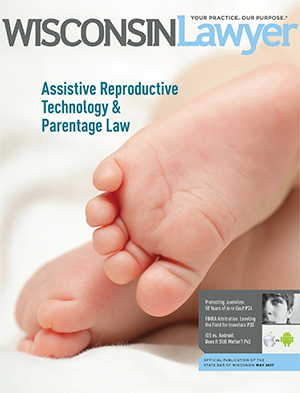 May 8, 2017 – The print May Wisconsin Lawyer™ is now hitting mailboxes. But why wait? With assistive reproductive technology outpacing Wisconsin parentage law, explore a possible solution to resolve disputes and grant parent status. Wondering how today’s juvenile courts are functioning on the 50th anniversary of In re Gault? Thinking about taking on a securities case, but worry your individual-investor client may be facing insurmountable odds? Here’s an overview of what you’ll find in this issue.
May 8, 2017 – The print May Wisconsin Lawyer™ is now hitting mailboxes. But why wait? With assistive reproductive technology outpacing Wisconsin parentage law, explore a possible solution to resolve disputes and grant parent status. Wondering how today’s juvenile courts are functioning on the 50th anniversary of In re Gault? Thinking about taking on a securities case, but worry your individual-investor client may be facing insurmountable odds? Here’s an overview of what you’ll find in this issue.
Resolving Disputes When Technology and Parentage Laws Collide
Advances in assistive reproductive technology give new options for parentage to individuals who are in same-sex marriages, are dealing with infertility, or both. But Wisconsin law is not keeping pace. To resolve disputes over who is the legal parent of a child – such as when a surrogacy agreement falls apart – Wisconsin courts and the legislature should give priority to the individuals who demonstrate their intent to become the parents by initiating the use of assistive reproductive technology. In “Out of Sync: Assistive Reproductive Technology & Parentage Law,” Brown County Circuit Court Judge Thomas Walsh proposes that courts, instead of cobbling together solutions on a case-by-case basis from the existing statutes, use an “intended-parent” test to resolve disputes and grant parent status.
How Are Today’s Juvenile Courts Performing?
May 2017 marks the 50th anniversary of the U.S. Supreme Court’s decision in In re Gault, a seminal case in which the Court granted certain rights to juveniles accused of committing crimes. In “Protecting Juveniles’ Rights: 50 Years of In re Gault,” Devon Lee reviews today’s juvenile courts, considers how juvenile courts protect minors’ due process rights, and outlines defense lawyers’ obligations to juvenile clients.
Securities Law: Don’t Be Afraid to Take on “Goliath”
Don’t avoid representing individual-investor clients with claims against brokers or firms because of negative stories about compulsory alternative dispute resolution. In “FINRA Arbitration: Leveling the Playing Field for Investors,” Aaron Aizenberg and Benjamin Prinsen explain that Financial Industry Regulatory Authority (FINRA) arbitration rules specifically contemplate, and seek to protect investors from, the disparity in the balance of power and financial resources between large brokerage firms and individual investors. Go ahead and represent “David.” This program and process often is advantageous to investors.
Other Columns: Mentoring New Lawyers, iOS vs. Android, Navigating Life’s Roiling Waters
10 Questions: In “Rochelle Johnson-Bent: Be the Mentor You Seek,” the recipient of the first Young Lawyers Division Outstanding Mentor Award urges others to help develop new lawyers. How to get started? Be the mentor you seek, and look for those who need help.
Technology: In “iOS vs. Android: Does It Still Matter?” Tison Rhine says differences between the two mobile operating systems are fewer than their similarities. But if the distinctions matter to you, read about them here.
On Balance: In “Is Life Balance Off? Lighten the Load,” Stephanie Ziebell says staying afloat in life’s roiling waters sometimes requires setting aside unnecessary cargo instead of merely shifting the load.
101: In “Practice the Mindful Use of Email,” Stephanie Melnick has tips to help you compose, transmit, and preserve email.
Ethics: In “LinkedIn Endorsements: Keep Out False Statements,” Dean Dietrich warns lawyers might be responsible for endorsements on their LinkedIn pages, even ones they haven’t approved or from people they don’t know.
Managing Risk: In “Engagement Letters – Protection You Don’t Want to Live Without,” Tom Watson says engagement letters are vital to good representation, because clients who are well informed from the start are more likely to be satisfied at the end.
Final Thought: In “Priceless: A Race Worth Running,” Kristy Yang, a lawyer who came to America as a child refugee, reflects on her election to the Milwaukee County Circuit Court in April, becoming only the second Hmong-American judge in the nation.
Check out the May Wisconsin Lawyer.
Links to Other Content
